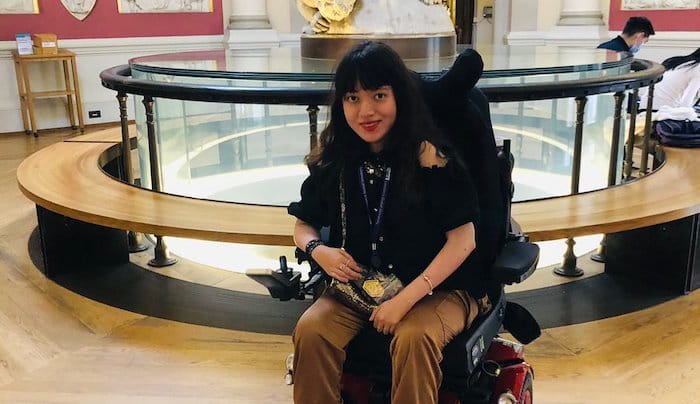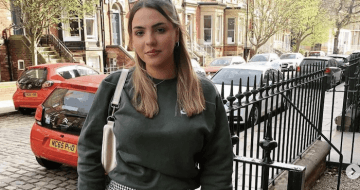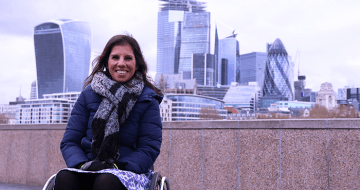BDABar founder Konstantina Nouka chats to Legal Cheek about her aims for the future

An aspiring barrister has launched a support network aimed at making the bar more accessible to disabled people.
With recent bar statistics showing that less than 7% of barristers have a disability, compared to over 16% of the wider employed population, Konstantina Nouka, 21, is on a mission to dismantle barriers and change the perceptions that affect disabled individuals in accessing the bar.
The Reading University law graduate, who holds a masters in human rights law from UCL, set up Bringing [Dis]Ability to the Bar (BDABar) last month. Here she chats to Legal Cheek about her plans for the future.
Legal Cheek: What prompted you to set up Bringing [Dis]Ability to the Bar and what are you hoping to achieve?
Konstantina Nouka: BDABar started from a simple Tweet asking people to join in order to form an organisation and a network to best support disabled aspiring barristers in accessing the bar; and in making the profession accessible and inclusive to them and to the next generation of disabled aspiring barristers. Once the committee started forming and I met the now vice-chair of the organisation, James Ekin, I understood that ‘my challenges’ in accessing the profession are ‘common challenges’ that disabled aspiring barristers face. James has been instrumental in shaping this network as he managed to share knowledge on invisible disabilities that I lacked as my disability is a visible one. We want BDABar to be inclusive and supportive to all disabled aspiring barristers.
Our organisation acknowledges that the challenges and barriers that disabled aspiring barristers face in accessing the profession stem from a lack of understanding and awareness of disabilities and the superficial understanding that the bar has of what accessibility and reasonable adjustments really mean and what they entail. Consequently, we hope to significantly improve accessibility and inclusivity at the bar for disabled individuals aspiring to pursue a career at the bar.
BDABar will be a platform where we can dismantle barriers and change the perceptions that affect disabled individuals in accessing the bar. How are we intending to do this? We will raise awareness on disabilities, accessibility and inclusivity via research, education, advocacy, mentoring, and other BDABar schemes. Through partnerships with other organisations we will enable the creation of a dialogue that best supports the practices and attitudes of the profession. We welcome anyone wishing to partner or in need of shaping policy, to get in touch with us and work with our equality, diversity and inclusion team, as well as our research and schemes teams.
https://www.instagram.com/p/CYmSTZookYr/
LC: What barriers do aspiring barristers with a disability, visible or otherwise, face when trying to access the bar?
NK: Barriers that disabled aspiring barristers face come in many shapes and forms. They range from lack of access to chambers, inns and courts to perceptions on how we view disability at the bar. The bar has been considered a quite traditional profession where disabilities and inclusion were not looked at in a practical light. Disability has seemingly always been a sticking point for the bar, when it comes to the creation of an accessible profession.
For us, if chambers and inns are not physically accessible, or open to change, we cannot open a dialogue to change the attitudes of “what makes a barrister?”. Drastic changes have been made in the wake of the global pandemic, i.e. virtual hearings and work from home, to keep the court system and the judiciary in motion, but we fail to appreciate how accessible this has made the profession.
All of these moves, to us, signify very encouraging things. This movement to an open, inclusive and accessible bar has in part come out of necessity, and we must not regress to in-person all of the time, as much as this was the ‘old normal’ for many it was a far more closed society. With more research, education and mentorship it can improve further.
LC: How is the organisation working to improve accessibility at the bar?
NK: At BDABar we believe that the best way to improve accessibility is to work together; we want to create strong and long-term relationships with barristers, chambers and the inns.
BDABar will achieve its objective, i.e. improve accessibility, by research, creating a strong equality, diversity and inclusion policy, education, two-way mentorship and other schemes such as mini-pupillages. Through research we want to develop an in-depth understanding of barriers that disabled aspiring barristers face and how to best overcome those barriers and via the two-way mentorship we want for members of the bar to share their knowledge of how the profession operates with us and our members, and for us to share our knowledge on disabilities, accessibility and inclusion.
LC: What advice do you have for disabled aspiring barristers who may be discouraged from joining a profession they may consider to be unrepresentative?
KN: The profession is developing and improving slowly. As a disabled aspiring barrister with a rare physical disability, I felt lonely on my journey to the bar until I met my fellow Committee members and I understood that there are so many people who have similar aspirations to me and want to join the bar. I felt empowered and I felt community and support. In addition to BDABar, there are so many organisations that aim to improve inclusivity at the profession so that gives me hope that together we can ensure that disabled aspiring barristers don’t feel discouraged.
The figures presented give a stark reminder to us all that a profession that’s core aim is to advocate for the minority in the face of adversity, discrimination and oppression needs to do more to bolster its own discouraging figures. Our point to the bar is that we know this profession is tough, as is getting there, and with all of the barriers which are already being tackled: financial, educational, and social mobility; disability remains the outlier. If we can get there, with the added challenges a disability brings, and the academic rigour necessary, we need to be best supported and feel included as this is the only way we will be able to achieve our full potential as barristers.
LC: What’s next for BDABar?
KN: BDABar is currently drafting its one-year and five-years plan!
Within our first year of operation we intend to:
• register as a charity
• launch our two-way mentorship scheme (estimated launch in April 2022)
• launch our mini-pupillage scheme
• lead three collaborative research projects
• lead research projects looking at:
– statistics on disability in the profession
– what the term inclusivity really means
– how tech can support disabled aspiring barristers in their journey at the bar
• events for our members to network with barristers, chambers and the Inns of Court
Moreover, BDABar is recruiting three volunteers to join our Equality, Diversity and Inclusion Team so please visit our website for more information.
BDABar is collaborating with Women High Up for an event to celebrate International Women’s Day 2022. The event is scheduled to take place on Tuesday 8 March 2022 from 7pm. More information will be released in the coming weeks and the speakers will be announced soon.
This article has contributions from James Ekin, vice chair and co-founder of Bringing [Dis]Ability to the Bar.


